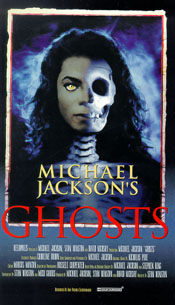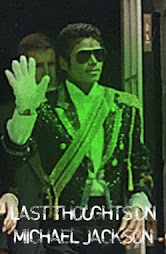Inevitably, of course, people will be producing documentaries and books about Michael Jackson for who knows how many decades. If anyone wanted to, it’s interesting how easily they could break his life
into decades: the story of Michael Jackson is very much an opera in five acts, and each act corresponds pretty much exactly to a decade. To whit:
Michael Jackson was born in 1958, and the first decade of his life was the only obscurity he knew – the infancy is here, but so is the first stage of climbing to success: Joe Jackson hustling his kids around the Detroit area, making it all the way to the Apollo even. The initial overtures with Gladys Knight, Bobby Taylor and the Notown machine.
“I Want You Back”, the Jackson 5’s first Motown single and their first #1, was released in
1969. This rather definitively begins the era of Michael’s celebrity and, in fact, is his era of ‘child star’ celebrity. This decade takes Michael Jackson a long way – from obscurity to fame to relative obscurity again to fame again – but sees the whole 10 years pass with Michael Jackson viewed as a ‘kid star’ and as a Jackson family member first and foremost.
This definitively changed with Michael’s first post-Motown solo album, “Off the Wall”, released in 1979, which started the Michael Jackson supernova that would peak a few years later with “Thriller”. “Off the Wall” introduced Jackson the adult sex symbol as well as Jackson the solo star with several has-been brothers. The next ten years are, of course, the pinnacle of the story: the mountaintop he spent two decades rising toward and would spend two decades falling from.
The next step is not so clear. Certainly between “Bad” and “Dangerous” 80s Michael was replaced by 90s Michael, when the ‘wacko’ stopped being comic and started being tragic. The star still shone bright, but there were always complications. This is where Michael Jackson and the world turn from allies to bitter enemies. I’m going to pick Michael Jackson’s purchase of Neverland Ranch in
1988 as the symbol of this descent, for while Neverland Ranch initially seemed fun-wacko, it became the symbol of his detachment from normalcy and, in many people’s minds, from civility.
Michael Jackson ends the 90s constantly on the defensive, bruised and battered from scandals and from the stress of arguing against them. Throughout the 90s, Michael Jackson made a concerted effort to keep his celebrity status alive, and in fact sold CDs in volumes that, while of course much less than in the 80s, were still nothing to sniff at.
It’s a little bit late, but I think the release of Michael Jackson’s final album “Invincible” in 2001 inaugurates the final era of Michael Jackson’s life, in that its relatively poor performance and, more importantly, poorly co-ordinated marketing effort by Sony and Jackson himself, really shows Michael Jackson’s final decade-long retreat from public life: a decade in which he was, artistically, completely adrift, the attention given his legal/publicity issues absolutely dwarfing the attention given his creative efforts – which were all but non-existent in the years following “Invincible”.
It is interesting, then, that 2009 was bringing about a historical era-change again inasmuch as Jackson was determined to re-enter the public arena after his self-imposed decade in the wilderness. As it is, of course, 2009 is where the story ends.






